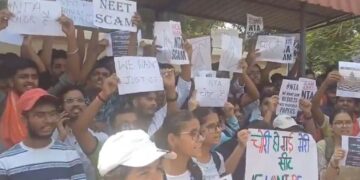Four Mumbai students– Sidharth Jain (17), Aasimm Khan (17), Tvisha Gala (16) and Kareena Shankta (17), have won laurels for 2 projects at the Initiative for Research and Innovation in STEM (IRIS) National Fair.
Of these four, Sidharth Jain and Aasimm Khan, both from Jamnabai Narsee International School, have won the Grand Award at the IRIS National Fair for showcasing their non-invasive screening and classification of skin cancer lesions in genital regions for showcasing their non-invasive screening and classification of skin cancer lesions in genital regions. They will now represent India at the Regeneron International Science and Engineering Fair (ISEF), a mega international competition to be held in the USA later this year.
The other two students Tvisha Gala and Kareena Shankta, also from Jamnabai Narsee International School won the Special American Psychological Society Award at IRIS for devising scalable measures of dyslexia in children through eyeball tracking and phonological testing using machine learning algorithms.
All the four students are mentored by an excellent team of tutors of OMOTEC (On My Own Technology), which teaches STREAM (Science, Technology, Research, Engineering, Art and Maths) and courses on robotics, among others.
OMOTEC Co-founder Shekhar Jain said : “We are really proud of our students for winning this prestigious award. Their project, backed with machine learning-based skin cancer recognition and analysis system which also creates a haptic 4D haptic model for distance diagnosis was appreciated at IRIS National Fair. We wish them more success in the future.”
The project presented by Sidharth and Aasimm was aimed at screening suspicious lesions on the skin of the genitalia region to aid dermatologists to conduct only necessary biopsies with least invasive measures thus avoiding unnecessary lesion removal and pain, since biopsy for skin lesions in the genital region is extremely painful resulting in severe pain, infection, numbness, stinging, bleeding and blackness in the area.
The scope of the project identifies non-cancerous and cancerous, pre-malignant and malignant skin lesions and then specifically classified into five cancer classes as Actinic Keratosis, Basal Cell Carcinoma, Intraepidermal Squamous Carcinoma, Melanoma, and Squamous Cell Carcinoma. Among these cancers, Squamous Cell Carcinoma (SCC) is estimated for about 80 per cent of vulvar and penile cancers.
The innovation by Tvisha Gala and Kareena Shankta included designing a prototype to identify dyslexia in children through eyeball tracking and speech recognition technology.
The project is crucial as the onset of dyslexia in children begins as early as 5 or 6 years of age when the child starts developing the skill of reading and it is very difficult to identify it at such a tender age. But with this prototype screening quantifiably identifying the problem at a very early age will be possible by an eyeball tracking and speech recognition technology.









